A political crisis that has gripped this island nation since October is coming to a head this week, when Sri Lanka’s highest court is expected to issue a pivotal ruling in a dispute that has left the country with two people claiming to be prime minister.
The outcome could lead to deeper divisions or push the feuding factions toward a resolution, according to officials and analysts, with implications beyond Sri Lanka. The Indian Ocean nation of 21 million people is positioned along critical shipping lanes and has long been a focus of competition for influence among India, China and the West.
President Maithripala Sirisena ignited the crisis on Oct. 26, when he announced he was sacking his handpicked prime minister, Ranil Wickremesinghe, and replacing him with a former president, Mahinda Rajapaksa, who is popular with the country’s Sinhalese Buddhist majority.
Mr. Wickremesinghe, who has the backing of leaders in parliament, refused to step down and has remained in the official prime minister’s residence even as Messrs. Sirisena and Rajapaksa have brought in a new cabinet and taken over state media outlets. Each side decries the other as illegitimate.
“What’s happened has the shape and structure of a coup even though it hasn’t involved military weapons,” said Nishan de Mel, an economist and political analyst at Verité Research, a think tank in Colombo, the capital. “Sri Lanka has never experienced something like this before.”
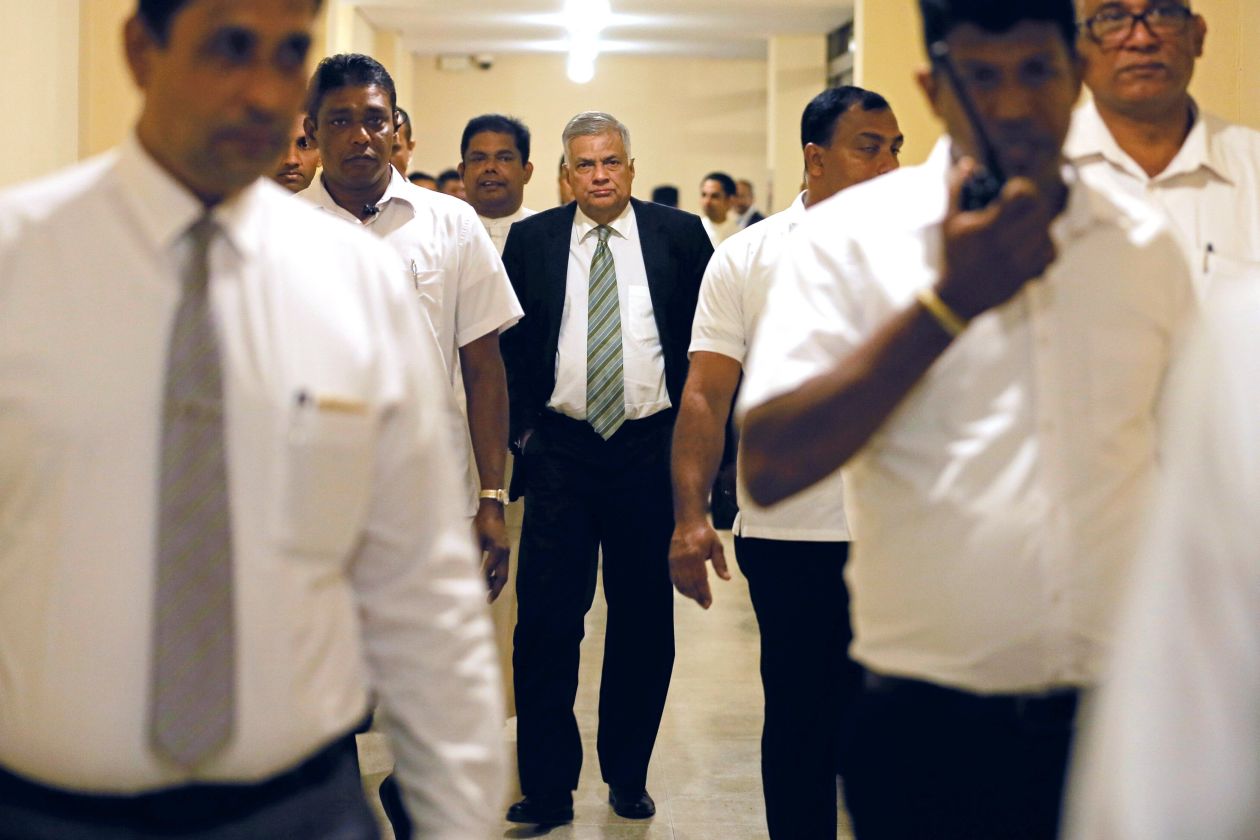
Ranil Wickremesinghe has the backing of leaders in Sri Lanka’s parliament. Photo: dinuka liyanawatte/Reuters
On Monday, an appeals court stayed the appointment of Mr. Rajapaksa and the new cabinet until it issues a ruling next week. Mr. Rajapaksa said he would appeal the stay and Mr. Sirisena said he would review it.
The crisis sparked a melee last month on the floor of parliament. And the economy has taken a hit—the European Union issued a travel advisory and tourist bookings declined, and the government’s credit rating was downgraded.
The currency has also weakened and international institutions have paused some lending and aid programs, including a critical installment of a loan from the International Monetary Fund and talks over a grant of hundreds of millions of dollars from the U.S.
Western governments are watching closely to see how the matter is decided. An orderly, transparent resolution backed by the courts would likely mean increasing engagement with India and the West after a brutal 30-year civil war that ended in 2009 left Sri Lanka internationally isolated.
But ongoing political paralysis, or further turmoil featuring military intervention or street protests, could set the country back on a course toward isolation and once again reliant on China, the one major power that has congratulated Mr. Rajapaksa for his recent appointment. Sri Lanka became heavily dependent on Beijing for loans and political support during Mr. Rajapaksa’s presidency, which lasted from 2005 to 2015.
The confrontation has its roots in the election that ended Mr. Rajapaksa’s presidency.
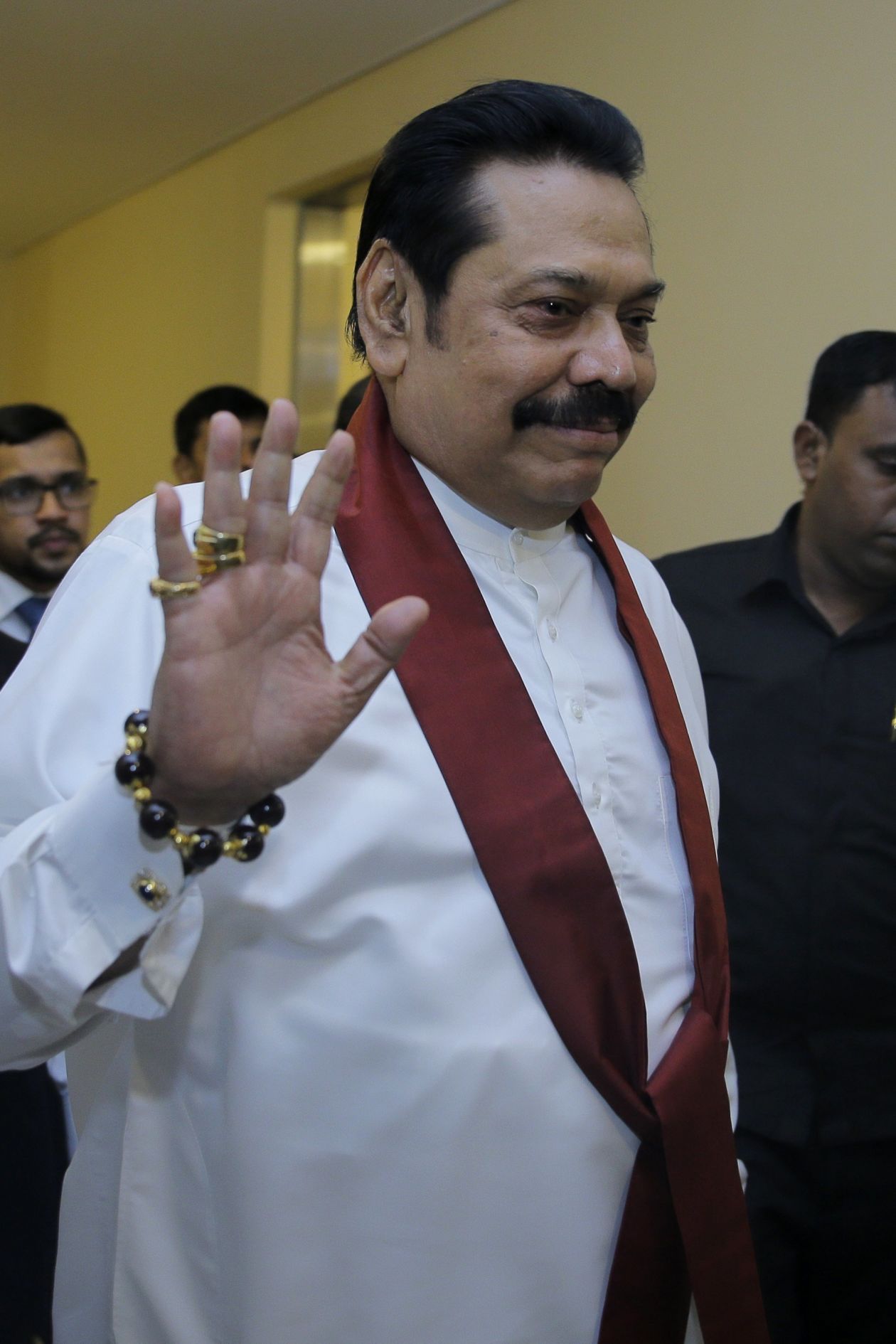
Sri Lanka's former president, Mahinda Rajapaksa, is popular with the country’s Sinhalese Buddhist majority. Photo: Eranga Jayawardena/Associated Press
Mr. Sirisena, who served in Mr. Rajapaksa’s government, ran against him in 2015. Capitalizing on concerns about alleged corruption and the growing power of the president’s family, Mr. Sirisena won a surprise victory and appointed Mr. Wickremesinghe, the head of the main opposition party, as prime minister.
The unlikely pair launched an effort to curb the power of the presidency by shortening the term by a year, and by setting a two-term limit. The changes also required the president’s pick for prime minister to have the support of a majority in parliament, and only allowed the president to dissolve parliament in the final six months of a five-year term.
But Sri Lanka’s economy has slowed in recent years, and tensions between Mr. Sirisena, who comes from a working-class family, and Mr. Wickremesinghe, a lawyer born into Sri Lanka’s elite, have grown.
Mr. Sirisena blames Mr. Wickremesinghe for the economic slowdown and accuses him of being aware of what Mr. Sirisena described as an assassination plot against him.“I had no choice but to go ahead with Rajapaksa,” he said, noting that Mr. Rajapaksa had assured him he could win majority support in parliament.
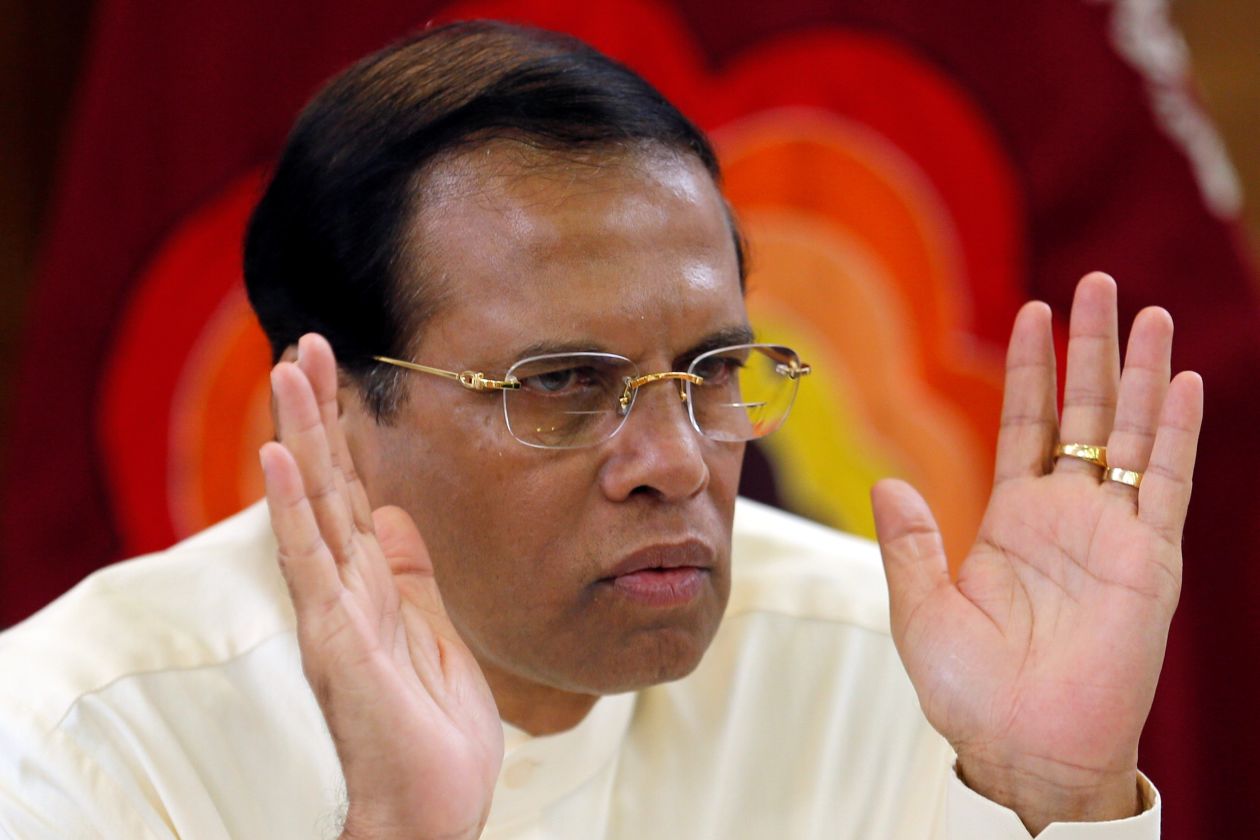
President Maithripala Sirisena blames Mr. Wickremesinghe for the country’s economic slowdown. Photo: dinuka liyanawatte/Reuters
Mr. Wickremesinghe denies he was aware of or involved in any attempt on Mr. Sirisena’s life and blames the country’s sluggish economic performance on hefty payments for debt incurred under Mr. Rajapaksa.
“In 2015, the people gave a mandate to Mr. Sirisena to get rid of Mr. Rajapaksa. He can’t just bring him back and make him prime minister,” said Mr. Wickremesinghe.
Mr. Rajapaksa, though a spokesman, declined to comment. He has defended his appointment as an appropriate and legal move by the president to install a more effective and popular government.
After Mr. Wickremesinghe refused to step aside and Mr. Rajapaksa failed to win parliamentary backing, Mr. Sirisena announced he would dissolve parliament, despite being more than six months from the end of his term, which ends in 2020.
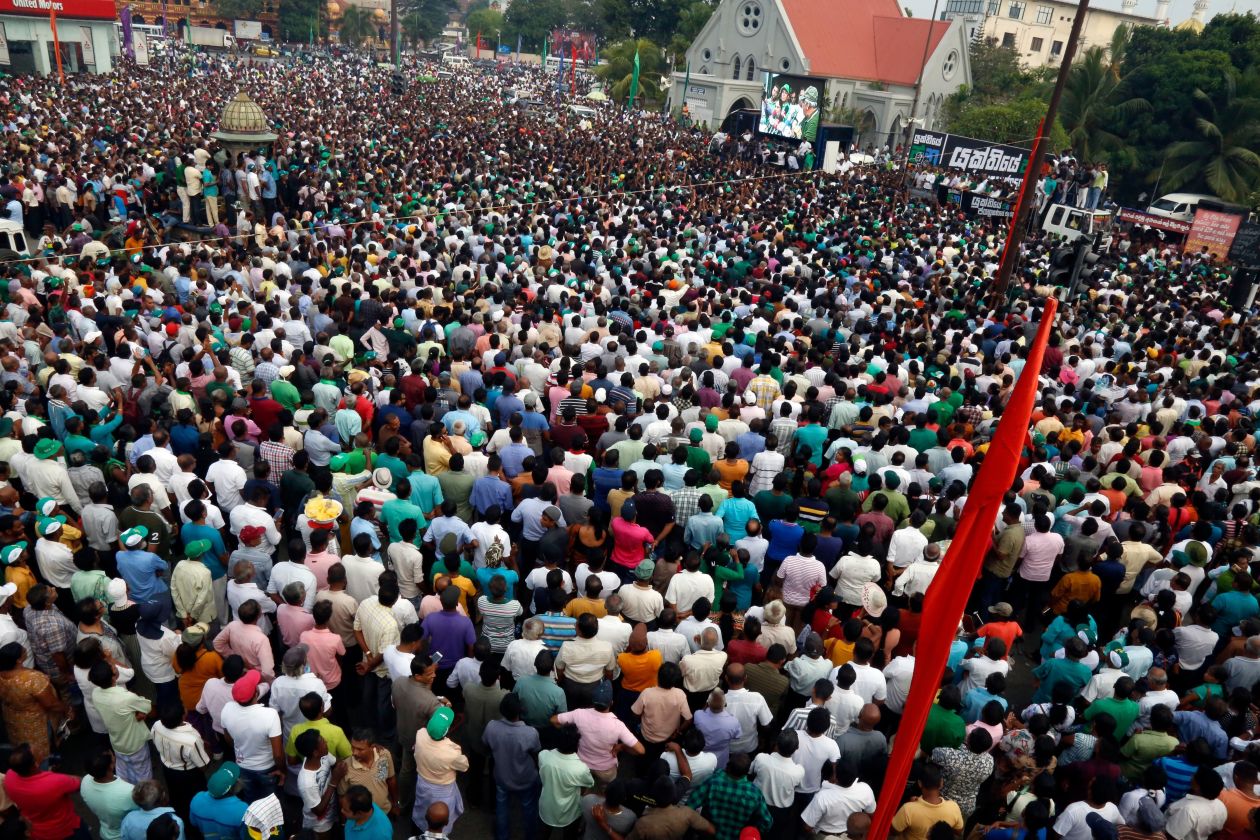
People gathered last month at a protest rally in Colombo organized by Mr. Wickremesinghe’s party. Photo: m a pushpa kumara/epa-efe/rex/Shutterstock
This week, Sri Lanka’s supreme court is expected to decide whether Mr. Sirisena’s move was constitutional.
A deal between the two sides that sidelines Mr. Rajapaksa for now remains possible. Mr. Sirisena said he is willing to appoint another candidate who would have majority support in parliament. But Mr. Wickremesinghe’s backers control the majority and say they will only support him. Both sides are jockeying ahead of a possible parliamentary election, which could happen as soon as early next year.
And Mr. Rajapaksa is continuing to try to build popular support, appearing on posters visible across much of the country. The blunt appeal concerns some observers. “They may not be willing to take no for an answer,” said Alan Keenan, an analyst with the International Crisis Group, which monitors global conflicts.
(The Wall Street Journal)
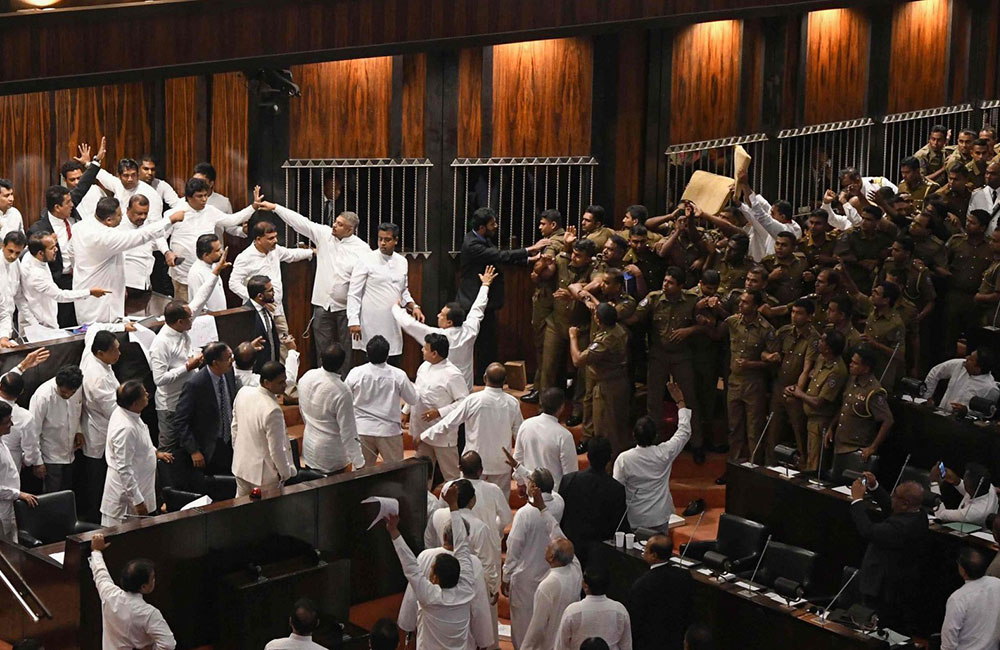
Leave your comments
Login to post a comment
Post comment as a guest